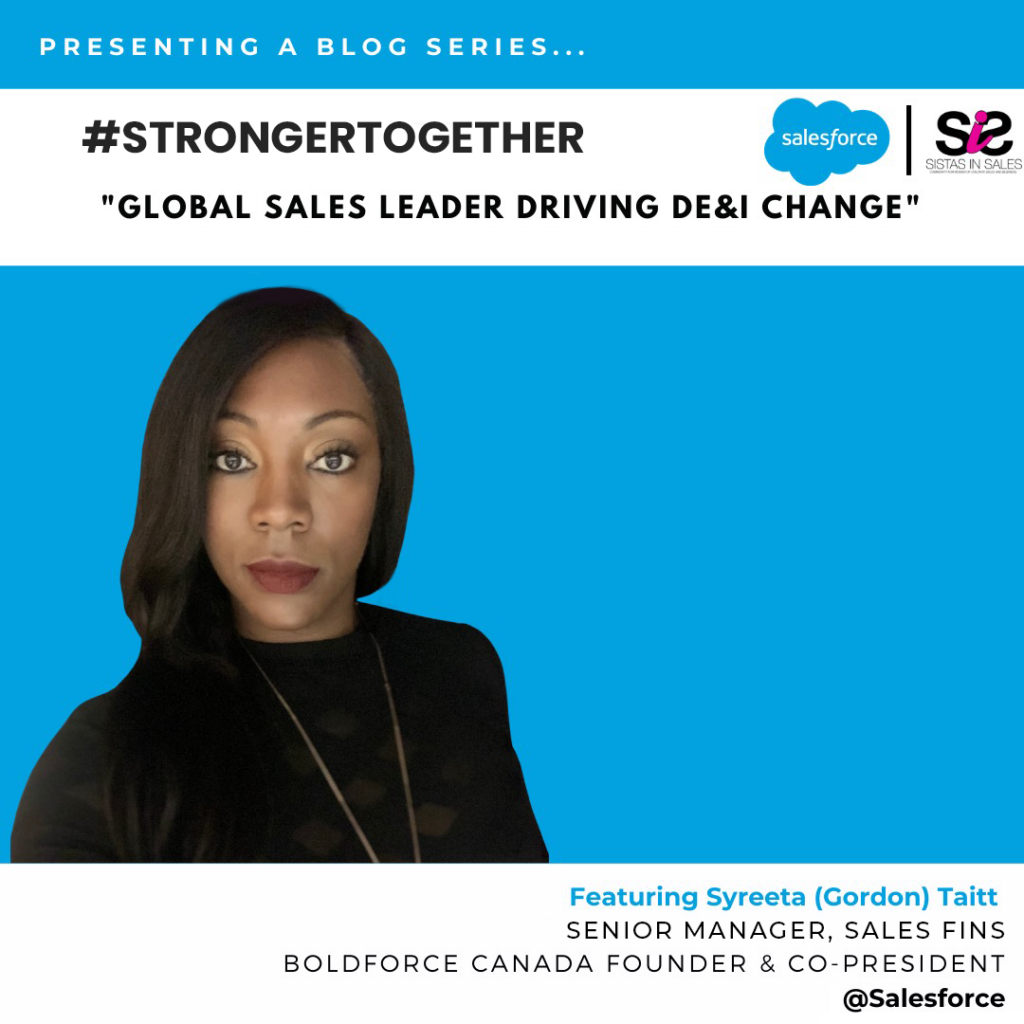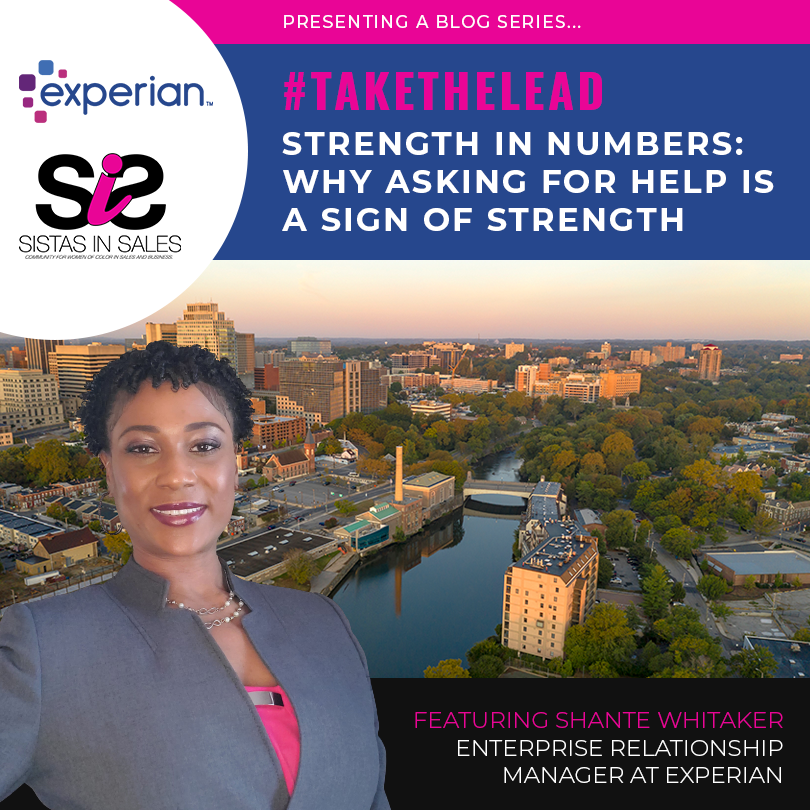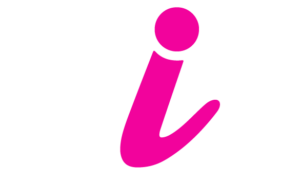#StrongerTogether: Global Sales Leader Ensuring Work-Life Balance While Driving DE&I Change

Syreeta (Gordon) Taitt, a Senior Manager, Sales FINS. and BOLDforce Canada Founder & Co-President, shares how her desire to maintain work-life balance has impacted her career journey. She also talks about how her unique global background and experiences helped catapult her career. Check out Syreeta’s insights below to set yourself apart as a professional saleswoman of color. Starting her career as a bilingual data translator, Syreeta saw first-hand how data provides valuable business insights. As a Customer Service Representative, her curiosity and desire to learn more led to a sales role. I asked her to tell us about her entry into sales. I joined a tax and accounting software company to break into a technical role, and that’s where my love for software began. I worked in customer service, answering calls from account executives and customers about their software. I assisted them and described the features and functionalities of the software. I said to myself, “I am fielding these questions from the account executives; what do they do?” I started networking to understand what it means to be in sales. Shortly after, I was promoted to an internal account management role, selling the tax and accounting software. When I moved into property management software and enterprise-style software sales, the company was using Salesforce. Afterwards, Salesforce reached out and asked if I would be interested in interviewing with them. The first time Salesforce reached out, I declined because the timing didn’t work well for me. When the company reached out again with a brand new role, it piqued my interest. The role was for a position in the healthcare and life sciences industry. My grandmother had recently passed away from cancer, so it was interesting to learn more about the U.S. health system and the kind of support that was in place. You were recently promoted from leading an outbound Business Development Representative (BDR) team to now leading a small business FINS Sales team. Can you tell us about your transition into sales leadership and your Global BOLDforce role? I wanted to get into a leadership role and understand more about what it’s like to be a leader at a company. My BDR team was prospecting into organizations to try to uncover opportunities and projects for the account executives. Learn more about our open roles at Salesforce here! What excites me most is seeing the potential of my reps and seeing them realize that potential. I’m positive and always see the best in people. I always try to tell coworkers, direct reports, mentees, friends, etc., “I know that you can get promoted. I know that you can do this job and do it well, and I know you can do the next job well.” But until they believe it, it is not going to happen. The moment you see the switch, when they realize they can do this — that is amazing. It is similar to parenting. You tell your kids many things, repeatedly. You explain, and you try to show them the right way. You hope that they are listening, and then one day they finally turn around, and they say your words back to you or show you, with their own flavor. That is what excites me about leadership and my team. I’m seeing more and more everyday that they’re finding that courage to go above and beyond. It’s all them. I also founded BOLDforce Canada, here in Toronto. BOLDforce, which stands for the Black Organization for Leadership and Development, is a Salesforce Equality group created to expand and empower Salesforce’s Black community. BOLDforce started in the U.S., but there was no presence in Canada. I realized the culture at Salesforce’s Toronto office did not quite reflect the rich diversity of the city. I wanted to make sure there was a safe space for Black and Brown individuals to have conversations and, from a leadership and development standpoint, that they had a support system in place. I have also taken on a global BOLDforce role, in which I support BOLDforce globally from a growth standpoint. In this role, I ask myself: how can I make sure that we are continually retaining our Black employees and growing our number of Black employees, from internships to leadership roles? In general, my work with BOLDforce is to help ensure that there is a space for individuals to feel supported in their daily lives. Learn more about Syreeta’s game changing work with BOLDforce and what it takes to become a successful saleswoman at Salesforce here. Can you tell us more about your unique global background and experience? My background is an interesting one, often referred to as a unicorn for my unique background and experience. I was born in the UK and my parents are Jamaican, so I’m Jamaican through and through. I was raised all over the world — that is where my bilingualism and love of languages comes from. And technology is really just another language. I spent over a decade of my life in Kenya and then another decade in Geneva, Switzerland, and then lived two years in the U.K. I came to Canada to continue my education, and, coming from Switzerland, hospitality was on the top of my mind. I attended Ryerson University in Toronto and studied hospitality and tourism with a minor in communications. I also continued studying French, which I learned while in Geneva. I quickly realized that I was not a fit for the hospitality field. I’m not the type to be working on holidays; I enjoy my holidays and weekends. And, of course, with two kids, it makes a whole lot more sense to have the stability of a Monday-to-Friday role. I believe that a person’s industry and company should support them and their values in all ways, shapes, and forms, whether they are a parent or not. I found that as a mother, I could do sales. During the COVID-19 pandemic, we have seen an increase in the importance of work-life balance. Tell us how you make it work. Growing up,
#TAKETHELEAD Strength in Numbers: Why Asking for Help is a Sign of Strength

As we continue to navigate our careers in the ever-shifting economy, it is important to keep in mind the value of asking for help. While some may associate asking for help with inexperience, remember: success leaves clues. By asking questions and seeking out the advice of successful performers in your industry, you will be able to leverage their insight to develop your own success and learn from their mistakes to avoid making the same ones yourself. Asking for help is a sign of a success-oriented mindset and one of the easiest ways to level-up your career by learning from others. Even what may feel like a stupid question can be an excellent opportunity to learn something new and take a step forward in your career. For more on the importance of asking for help, I would like to share a conversation I had recently with Shante Whitaker, a sales leader at Experian, who successfully navigated a career shift from human resources to financial industry sales. Shante began her career selling staffing solutions to financial institutions. After receiving her BS/BA from University of Delaware , she joined Delaware’s first Black woman-owned staffing agency – and quickly found sales to be a lucrative field. Shante also learned a lot about working with people and gained valuable management and leadership skills. As the Delaware economy took a downturn, major manufacturing plants closed and large financial institutions merged. As a result, Shante proactively shifted her focus and began selling technology staffing services to the federal government in Washington, D.C. Here’s what Shante shared about her tech sales journey. Q: Tell me more about your career shift from IT recruiter to IT project manager. What prompted you to make that shift? A: It’s all about identifying your transferrable skill set . In 2010, I decided it was time for a change. I thought, “if I can package up software candidates and sell them to companies, then I can package up code and get projects into production.” Transitioning into a new industry, it was important for me to have the skills and competencies I needed to be successful, so I obtained my Project Management Professional and Professional Scrum Master certifications to help establish credibility with my clients and colleagues. My first IT project management role was at a major financial services company, and I worked in that role for about four years, then moved into Credit Risk project management where I ultimately became a PM Team Lead. During my years of IT project management, I became known as the crisis PM, meaning, when a project was not going well, I was called on to navigate out of the choppy waters and return the project back to smooth sailing. In 2018, I was tapped on the shoulder and requested to support a large initiative to help Experian become further integrated within our credit decisioning processes I loved that Experian had been recognized for years as a great place to work, and the team was collaborative and transparent. I was drawn to their approach to solutions and their high energy, passion, and intelligence. I applied for a sales role, met with an interview panel, completed the hiring assessments, and joined Experian in 2019. Best career decision I’ve made in a long time. Q: That’s a big move – leaving your employer to go work for one of their clients. What advice would you give about making that kind of move? A: Don’t burn bridges. It’s very important to demonstrate value to both organizations, to show them how this will be a win-win. It’s really important to build and value strong relationships because you never know when you’re going to run into someone again, especially in the financial institution industry, or in sales generally. The industry may seem huge, but it’s smaller than you think. Q: What would you tell women about taking the lead and getting a seat at the table? What’s it like at Experian? A: One of the things that I think is important when you take the lead is to ask the stupid or obvious questions. I know it may make people a little uncomfortable, but it has been very helpful for me. It’s something I didn’t do earlier in my career because I didn’t want to look inexperienced, but I’ve learned that to show I have control over the situation means asking every possible question, and normally there are three other people who had that same question. Don’t be afraid to ask and ask with confidence. Taking the lead definitely means coming in with confidence and a vision. You don’t want to waver, and you want to be respectful of the people who have already been there. Don’t demean people—work with people. Taking the lead really just means showing up, being confident in your abilities, and staying laser focused on the path forward —and don’t be afraid to ask for help or to ask the obvious questions. Be positive in your interactions with others, connect with people, and work with people. Say, “Thank you for doing that.” “What are you working on now?” “What excites you about that?” Talk a little bit about the pandemic and how you are reimagining or reinventing something. Learn more about taking the lead. Join us – we are here to #TAKETHELEAD! Sistas In Sales & Experian are thrilled to invite you to a virtual experience for Black History Month. Join Sistas In Sales, the global leader for women of color in professional sales, and Experian, the world’s leading global information services company, on February 26th from 1:30PM – 3:00PM for a two-part experience – learning, networking, and recruiting. Register Here Q: What excites you in your current work? A: Ever since the pandemic began, we’ve had to shift our approach because a lot of our clients were used to us showing up on site. It took some time to rework my approach in order to have that same level of engagement through a camera lens, but now I have three key tactics I
